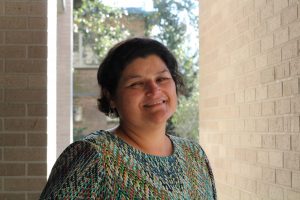Dr. Eva Silvestre: New interim director for the Center for Academic Equity
January 15, 2020
Eva Silvestre began her term as the interim director of the Center for Academic Equity at the beginning of the 2019-20 school year. Silvestre was preceded by Rebecca Mark, who recently accepted a position as director of the Institute for Women’s Leadership and professor of Women’s and Gender Studies at Rutgers University.
The CAE began in the fall of 2017 aiming to provide a diverse community of Tulane students with the tools to succeed in a college environment. Silvestre first became involved with the Center through CollegeTrack, a scholarship program that serves underrepresented and marginalized populations on Tulane’s campus, where she mentors five students.
“I have five students — four from New Orleans, one from L.A. — who are my mentees,” Silvestre said. “So that’s how I became first engaged with the Center is because the CAE provides the organizational support for not only CollegeTrack, but also for the Posse scholarship which is another scholarship that aims to support students who are basically non-white, also first-generation students.”
Additionally, Silvestre has worked on issues concerning academic inequity with the Office of Student Success on a variety of initiatives. There, Silvestre was able to study the pressing and controversial issues of diversity on Tulane’s campus — specifically on the small percentage of students of color or first-generation college students.
“I do a lot of the data analysis that looks specifically at things like what a small population of our campus are students of color, first gen,” Silvestre said. “Tulane is a unique environment for that, particularly when we look at first-generation students. Other colleges have much greater populations of students who would be considered first gen, but Tulane, it’s much lower in terms of this is not our population. Our population typically comes from parents who have gone to college or have advanced degrees as well.”
Going hand in hand with these statistics are socioeconomic issues that serve as significant barriers to receiving a higher education. As a public health professor and with a child of her own in kindergarten, Silvestre has witnessed a variety of instances of academic inequity.

“In my own classes I have seen issues of academic inequity in things like purchasing textbooks,” Silvestre said. “You know, it’s very expensive, and many of the scholarships that are available cover tuition and nothing else, so then it’s up to the student to make up the rest which can be a big challenge for when you’re taking five classes and there’s five different textbooks that you have to buy.”
Whether it be the inability of students to purchase textbooks, something that is often left out of scholarship packages, or the confusion surrounding OneApp, the charter school placement app in New Orleans, Silvestre has seen just how arduous receiving an education can be.
As director, Silvestre plans to focus on expanding the support available for students who get into a financial bind.
“It’s important to be able to have financial resources to help students who are in these difficult financial situations to not have that be a reason why they have to take a semester off,” Silvestre said. “Because once students start taking semesters off, it’s really difficult to get them back and engage them.”
Another population that the Center serves is Deferred Action for Childhood Arrivals (DACA) students, or those that were brought to the United States as children and do not have citizenship.
In January 2017, following President Trump’s inauguration, Tulane President Mike Fitts released a statement saying, “Other than international students here on student visas, Tulane does not track the immigration status of our students.” Tulane preserves the confidentiality of these students, and Silvestre recognizes the importance of creating a welcoming campus environment for undocumented students as well as students from other countries that come to Tulane for any length of time.
“[It’s] definitely a concern at all universities for how we have a welcoming environment not only for students who are undocumented but also just students who are from other countries,” Silvestre said. “If you’re coming from India or from China, we have to work really hard to be as welcoming as we can be where overseas the U.S. is getting a lot of negative press in terms of how we are dealing with the issue of immigrants.”
Silvestre said she is looking forward to working with the rest of the CAE team to tackle issues of academic inequity and make Tulane’s campus a more inclusive place for all students.









Leave a Comment